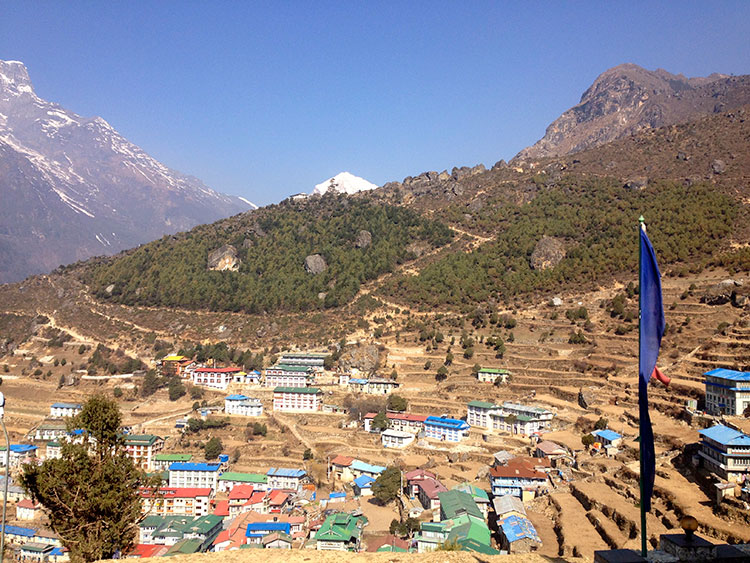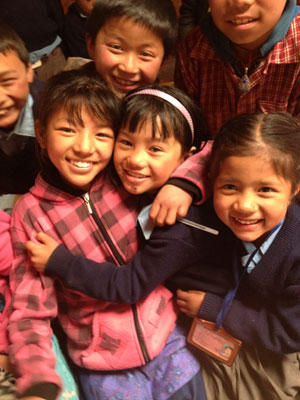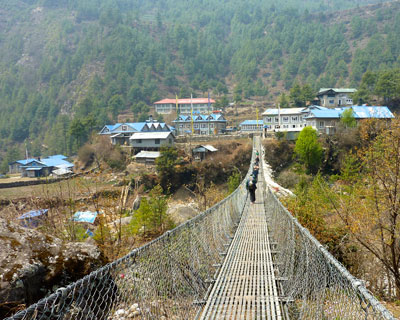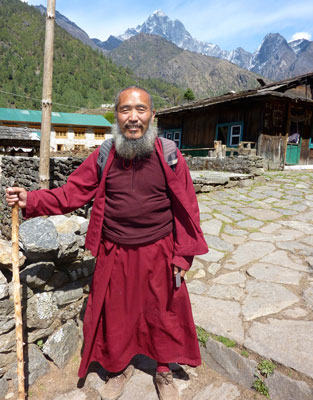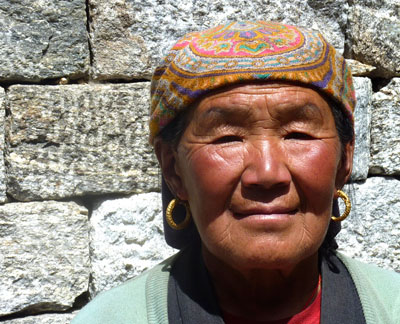Teaching – and learning – on a volunteering vacation in Nepal
This item appears on page 20 of the September 2013 issue.
by Suzi Colman; Commerce, Mi
“Take every precaution and abandon all fear.”
This quote by Mary Hall, a Victorian world traveler, is a simple motto, but it’s one that I fully embraced when I embarked on my lifelong goal of visiting eastern Nepal. Though I did want to see Mt. Everest, the highest mountain in the world, I was even more interested in getting to know Nepal’s Sherpa people and immersing myself in their culture.
Getting there
Through an organization called RCDP Nepal, I was assigned to teach English in a primary school in April 2013. That was the easy part. Getting to the Khumbu region of Nepal was a different story.
I flew to Dubai and then to Kathmandu. From there I took a short, scary and incredibly beautiful flight to Lukla Airport. That I even got on my flights as scheduled was lucky because the weather often forces cancellations. Travelers must add some buffer days to allow for this.
But after all that, my journey still wasn’t finished. Beyond Lukla Airport there are no roads, and the final leg of the voyage was a 3-hour hike at 9,500 feet over ridiculously uneven boulders. Not one step was easy or flat.
Finally, I reached my destination in the town of Ghat, the home of my local host, Dawa Jangbu Sherpa. He lives with his wife, Ang Dali, and his teenage son, Nawang, who happened to be home from his school in Kathmandu. They became my family for the next two weeks, welcoming me into their lives and home as I joined them for every meal, helped them with household chores and learned as much as I could about the strong culture of the Sherpa and their Buddhist faith.
Family stay
Dawa Jangbu Sherpa is a real leader in his community. He was once a monk, but after spending 10 years at nearby Pema Choling Monastery he decided to get married. He is still very involved in running this 500-year-old, 45-monk-strong monastery located a difficult hour-and-a-half trek up the mountain from his home.
Besides running the monastery, he has rescued children from either very poor or abusive homes, has cosponsored a few children to get them into boarding schools in Kathmandu and has raised two girls in his own home.
Ang Dali is a sweet lady, a good cook and a very hard worker. I was perpetually amazed at how much energy she exuded. She cooked breakfast, lunch and dinner on her wood-fired clay stove every day.
On top of that, she tends the farm; harvests and packages home-grown produce (onions and spinach) to sell at the Saturday market in Namche Bazaar, and has company over for dinner all the time. This was my first inkling that the Sherpa people possess super-human strength.
Their way of life is fascinating and taught me the beauty of simplicity, a concept I tried to take home with me.
My basic room in their home consisted of a bed and two windowsills for my clothes and toiletries. For my other needs, I had a toilet outside the house with no running water, but I did get a bucket of water for bathing when the occasion called for it. I felt a real sense of accomplishment upon figuring out how to allocate one bucket of water for shampooing and washing myself.
Just wandering around the village almost always led to a new experience for me. Families would invite me for tea and share stories of their life experiences as best they could in English.
For example, I met Chewang, a cousin of my host, who told me that he doesn’t have a need for supplemental oxygen when climbing Everest. He had not only climbed to the summit twice, he regularly climbs to Base Camp as a coordinator for trekkers.
Of course, Chewang was proven an “underachiever” when I met another cousin, who had reached the summit seven times!
I loved hearing the stories of all their accomplishments. I even celebrated the Buddhist New Year at a lama’s home. The memories of these cultural experiences will stay with me for a lifetime.
Seeking Everest
Inspired by these stories, I decided to go on a trek. While Base Camp was beyond my reach, I opted to trek to Namche Bazaar, a beautiful mountain village at an elevation of approximately 12,000 feet. I had heard there was a great view of Mt. Everest from just above the village and made reaching that my goal.
Dawa Jangbu Sherpa was my guide, and the 4-day trek was no walk in the park. We climbed up a mountain, then down to the Dudh Kosi River, crossing the river on beautiful swinging bridges only to go back up another mountain and down to cross the river again. To Dawa Jangbu Sherpa, it was nothing. For him, running up and down the mountain on uneven rocks and boulders seemed easier than walking on a nicely paved sidewalk would be for me.
As if to support my claims of just how superhuman Sherpas seem to be, along the way I learned that, while there are many porters and guides who can take you on the 2-week trek to base camp, if you plan to climb to the summit of Everest, you can only go with a Sherpa and not a member of another tribe.
A license for the climb costs a solo climber $25,000, and the total expedition can cost more than $75,000. Also, the expedition takes about two months. Needless to say, the view of Everest from Namche Bazaar was enough for me.
Teaching and learning
After the trek, I finally started teaching school. On the first day, 35 kids between the ages of six and twelve came to class. They probably all came because they were expecting presents, and, while they were correct, it still was a good way to get them to school.
I brought hats for all of them as well as dresses for the girls and shorts for the boys. They were so cute, but the shorts didn’t go over so well because they viewed them as underpants.
The next day there were fewer kids, but they were very enthusiastic. I enjoyed my time with them and they were eager to learn English.
One day, three girls invited me to meet their families and see their homes in Phakding. They patiently walked with me at my speed, which essentially tripled their usual 20-minute commute. When I got to their homes, each family offered me tea, and one offered fruit. I felt so welcomed by these children’s families.
Feeling energized by the tea and fruit, I walked back to my adopted home by myself. It felt really good to be alone with the Himalayas for the first time on my visit. As much as I loved the cultural immersion, sometimes it was just as special to be alone with the mountains. I was able to reflect upon the many steps I had taken on this journey. Often they were difficult, but I knew I would miss the place as soon as I left it.
The truly unique environment of the Himalayas was now a part of me. The natural beauty, high altitude and difficult terrain along with the resilience of the Sherpa people will remain with me forever.
The cost of this program was $259 plus $485 for two weeks of accommodations and food. Airfare, the biggest expense, was extra.
Remembrances
At the end of my two weeks, there was a celebration at the school. They gave speeches of appreciation, and the students and teachers gave me scarves for health and a long life.
At home, Ang Dali gave me a necklace that had been in her family for a long time and had a lot of sentimental value to her. I will cherish it for the rest of my life.
Dawa Jangbu Sherpa gave me a scarf to signify, in addition to a long life and health, a continuation of our friendship. The bond we built in two weeks has left an indelible mark on my soul.
In the meantime, while I have returned to the comforts of my home, Dawa Jangbu Sherpa is trying to establish a volunteer program for doctors who wish to go to Ghat. The closest optometrist is in Kathmandu, which requires either a 3-hour trek and a flight or a 5-day trek followed by a 10-hour bus ride. The closest dentist is at least two days’ walk away.
He’s also hoping to get an agricultural specialist to help them grow different crops at high altitudes.
I will do my best to maintain my friendship with him and his family and want to help him achieve his goals of bettering his village. If anyone reading this article is interested in volunteering, please e-mail me c/o ITN or contact RCDP Nepal (Kathmandu; phone, in the US, 254/304-8951).

